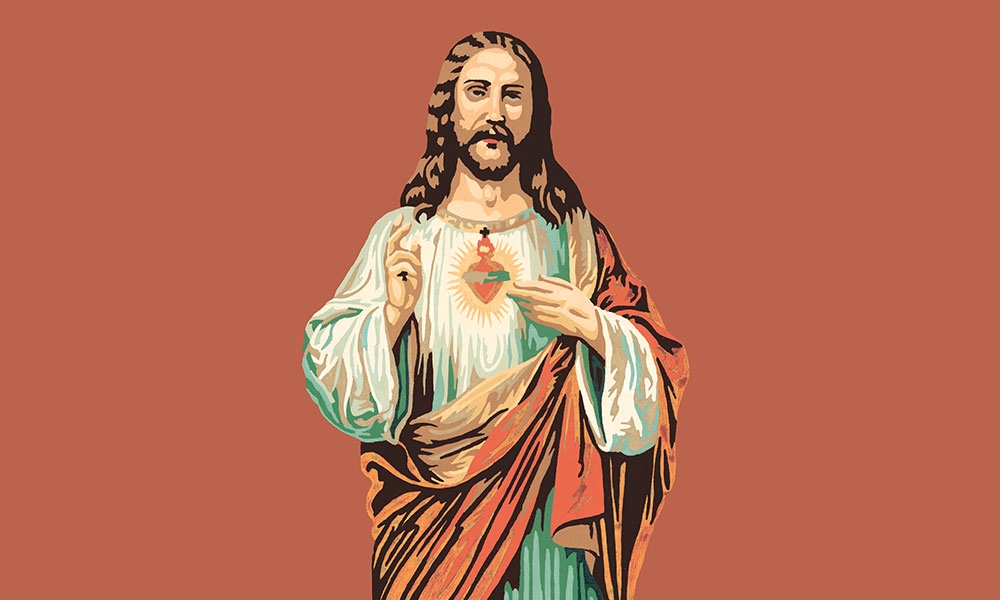
Loving the heart of Jesus in the Eucharist
Christ’s heart burns with love for us. We see this love in Scripture – moved with compassion, Christ feeds the famished crowd on their journey; he heals the sick, forgives sins, raises the dead and performs the ultimate act of love by dying for us. In our own lives, we ponder Christ’s love: for all eternity he knows and loves us; he personally thought of us and obtained all the graces we need during his passion; he lavishes blessings upon us; he sympathizes with us in our weaknesses; he remains with us, and gives himself totally to us, in the Eucharist.
Christ’s heart burns with love for us. We see this love in Scripture – moved with compassion, Christ feeds the famished crowd on their journey; he heals the sick, forgives sins, raises the dead and performs the ultimate act of love by dying for us. In our own lives, we ponder Christ’s love: for all eternity he knows and loves us; he personally thought of us and obtained all the graces we need during his passion; he lavishes blessings upon us; he sympathizes with us in our weaknesses; he remains with us, and gives himself totally to us, in the Eucharist.
In June, the Church celebrates two solemnities to meditate upon Christ’s love: the Most Holy Body and Blood of Christ (Corpus Christi) and the Most Sacred Heart of Jesus. The latter is celebrated the Friday after Corpus Christi. Why?
In 1675, Christ appeared to St. Margaret Mary Alacoque, a French nun. Holding a heart engulfed in flames, Christ proclaimed, “Behold my heart which so loved men.” He asked that devotion to his Sacred Heart be spread, particularly by celebrating it with a special feast.
Devotion to the Sacred Heart and Eucharistic devotion are inseparable. At the Last Supper, Christ reveals that the Eucharist stems from his heart. He shares with his Apostles that he longs to eat the Passover with them (Cf. Lk 22:15), and he prays that we may be one with him. (Cf. Jn 17:21) Christ fulfills these desires by instituting the Eucharist, in which he shares himself with us – he gives us his heart. This is love’s essence: the giving of oneself to the other.
Hence, the Eucharist is the visible reality of Jesus’ love. It makes present Christ’s act of love – it is Christ’s body and blood given up for us; it is the way by which Christ fulfills his promise to stay with us. It is Love Himself. It’s no wonder, then, that the Church calls the Eucharist the sacrament of charity, as it springs from God’s heart.
Jesus reminded St. Margaret Mary that his heart “spared nothing, even to exhausting and consuming itself” in showing his love for us. But how is this love returned? Although the only proper return is one of love, adoration and gratitude, Jesus expressed his sorrow that this is often not the response he receives. Many, he said, meet him in the Blessed Sacrament with ingratitude, irreverence, sacrilege, “coldness and contempt.” This is why Christ asked for the Church to celebrate his Sacred Heart the Friday following the Corpus Christi octave – to make amends and to console his heart.
To love Christ’s heart – to return his love with love – we can love Jesus, hidden in the Blessed Sacrament. Here are some practical ways:
- Lovingly receive the Eucharist. Prepare by arriving early for Mass. When receiving Communion, be cognizant of Christ’s presence and offer him acts of love.
- Learn about the Eucharist. Some reading suggestions include Cardinal Ratzinger’s God is Near us: The Eucharist, the Heart of Life or Vinny Flynn’s 7 Secrets of the Eucharist.
- Spend time meditating upon Christ’s Sacred Heart. Books such as The Devotion to the Sacred Heart by Father John Croiset, S.J. (St. Margaret Mary’s spiritual director) can provide inspiration.
- Go to Eucharistic adoration and make a holy hour – monthly or even weekly.
- Whenever you pass a Catholic church, stop and visit the Eucharistic Jesus. If you can’t stop in, offer a short prayer as you go.
May the Heart of Jesus, in the Most Blessed Sacrament, be praised, adored and loved with grateful affection, at every moment in all the tabernacles of the world, even until the end of time. Amen.
Maria Cintorino holds a degree in theology. Her writings have appeared in several publications including Homiletic and Pastoral Review, Our Sunday Visitor and the National Catholic Register.



